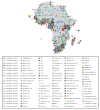Systematic Review of Important Viral Diseases in Africa in Light of the 'One Health' Concept
- PMID: 32325980
- PMCID: PMC7238228
- DOI: 10.3390/pathogens9040301
Systematic Review of Important Viral Diseases in Africa in Light of the 'One Health' Concept
Abstract
Emerging and re-emerging viral diseases are of great public health concern. The recent emergence of Severe Acute Respiratory Syndrome (SARS) related coronavirus (SARS-CoV-2) in December 2019 in China, which causes COVID-19 disease in humans, and its current spread to several countries, leading to the first pandemic in history to be caused by a coronavirus, highlights the significance of zoonotic viral diseases. Rift Valley fever, rabies, West Nile, chikungunya, dengue, yellow fever, Crimean-Congo hemorrhagic fever, Ebola, and influenza viruses among many other viruses have been reported from different African countries. The paucity of information, lack of knowledge, limited resources, and climate change, coupled with cultural traditions make the African continent a hotspot for vector-borne and zoonotic viral diseases, which may spread globally. Currently, there is no information available on the status of virus diseases in Africa. This systematic review highlights the available information about viral diseases, including zoonotic and vector-borne diseases, reported in Africa. The findings will help us understand the trend of emerging and re-emerging virus diseases within the African continent. The findings recommend active surveillance of viral diseases and strict implementation of One Health measures in Africa to improve human public health and reduce the possibility of potential pandemics due to zoonotic viruses.
Keywords: Africa; COVID-19; Ebola; Rift Valley fever virus; SARS-CoV-2; West Nile virus; avian influenza; coronaviruses; dengue; emerging; epidemiology; hemorrhagic fever; infectious diseases; influenza A virus; monkeypox; one health; pandemic; rabies; re-emerging; simian immunodeficiency; vector-borne; virus; zoonosis.
Conflict of interest statement
M.E.E.Z. is a team member of Duke One Health, Duke University, Durham, North Carolina, USA. M.E.E.Z. was awarded a subcontract research grant funded by NIAID and St. Jude CEIRS (contract no. HHSN272201400008C) to conduct influenza research. M.E.E.Z. was awarded a CEIRS Program at St. Jude CEIRS in St. Jude Children Research Hospital under same contract. The other co-authors declare no conflict of interest.
Figures


























References
-
- Ndembi N., Habakkuk Y., Takehisa J., Takemura T., Kobayashi E., Ngansop C., Songok E., Miura T., Ido E., Hayami M., et al. HIV type 1 infection in Pygmy hunter gatherers is from contact with Bantu rather than from nonhuman primates. AIDS Res. Hum. Retrovir. 2003;19:435–439. doi: 10.1089/088922203765551773. - DOI - PubMed
-
- World Health Organization . Ebola Virus Disease- Democratic Republic of Congo, External Situation Report 82. WHO Regional Centre for Africa; Pretoria, South Africa: 2020. pp. 1–9.
-
- Okareh O.T., Morakinyo O.M. Monkeypox in Nigeria: A case report of re-emerged disease outbreak. J. Microbiol. Exp. 2018;6:89–91.
LinkOut - more resources
Full Text Sources
Miscellaneous

